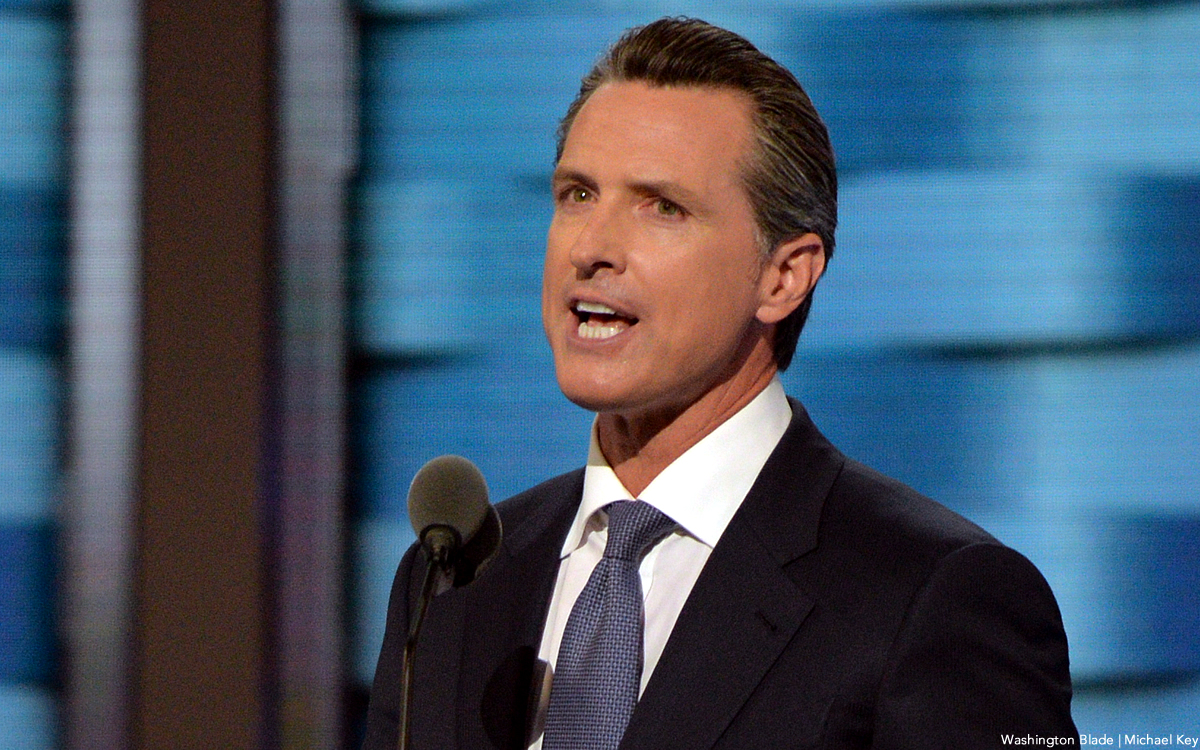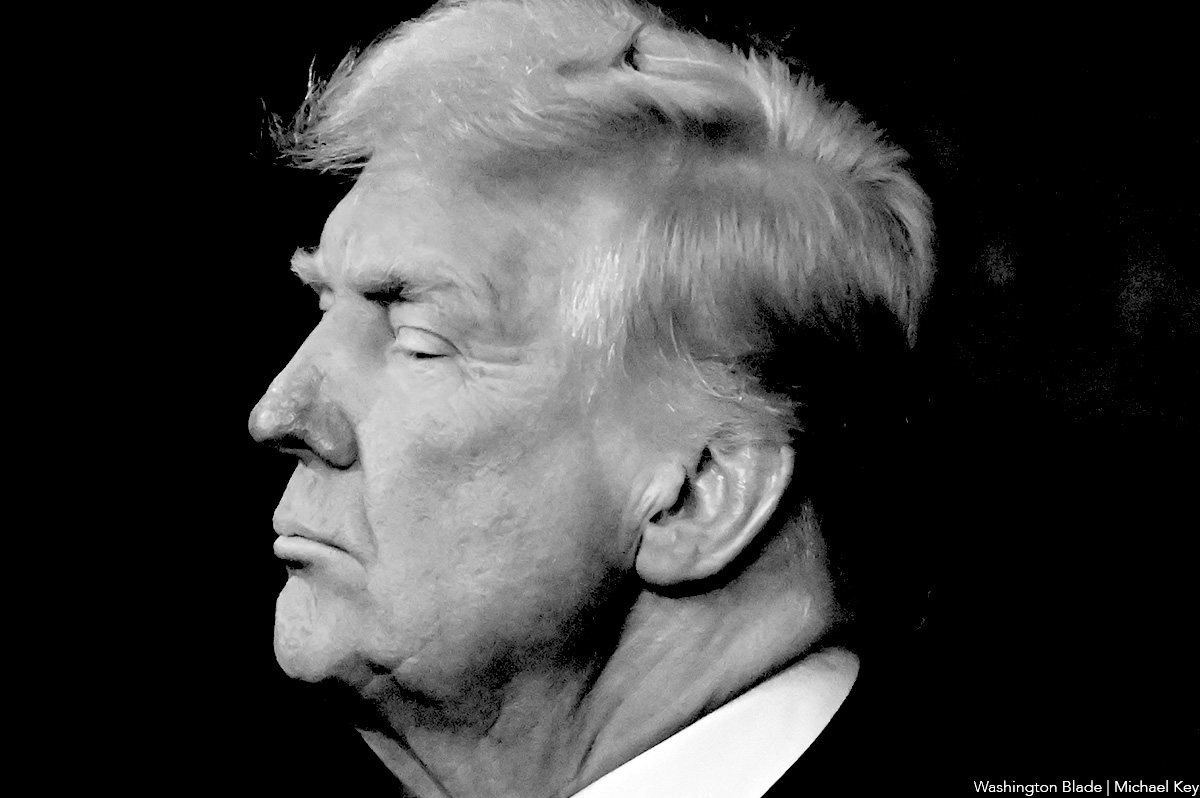Federal Government
Adm. Levine, Admin. Guzman visit LGBTQ-owned dental and medical practices
Officials talked with the Blade about supporting small businesses

The Washington Blade joined Assistant Secretary for Health Adm. Rachel Levine of the U.S. Department of Health and Human Services and Administrator Isabel Guzman of the U.S. Small Business Administration as they toured two LGBTQ-owned small businesses on Tuesday in Washington, D.C. — Big Gay Smiles and Price Medical.
The event provided an “amazing opportunity” to “talk about the different synergies in terms of small businesses and the SBA, and health equity for many communities,” including the LGBTQ community, Levine told the Blade.
Representation matters, she said, adding, “that’s true in dental care and medical care,” where there is a tremendous need to push for improvements in health equity — which represents a major focus for HHS under her and Secretary Xavier Becerra’s leadership, and in the Biden-Harris administration across the board.
“Small businesses identify needs in communities,” Guzman said. With Big Gay Smiles, Dr. Robert McKernan and his husband Tyler Dougherty “have clearly identified a need” for “dentistry that is inclusive and that is respectful of the LGBTQIA community in particular.”
She added, “now that they’re a newly established business, part of the small business boom in the Biden-Harris administration, to see their growth and trajectory, it’s wonderful to know that there are going to be providers out there providing that missing support.”
The practice, founded in 2021, “is so affirming for the LGBTQIA community and we certainly wish them luck with their venture and they seem to have a great start,” Levine said. “They’re really dedicated to ending the HIV epidemic, providing excellent dental care, as well as oral cancer screenings, which are so important, and they’re really providing a real service to the community.”
Big Gay Smiles donates 10 percent of its revenue to national and local HIV/AIDS nonprofits. McKernan and Dougherty stressed that their business is committed to combatting homophobia and anti-LGBTQ attitudes and practices within the dental field more broadly.
“We try to align our practices here within this dental office to align with the strategic initiatives being able to help reduce HIV transmission, reduce stigma, and help to ensure people have the knowledge and [are] empowered to ensure that they’re safe,” Dougherty said.
McKernan added, “With the Academy of General Dentistry, we’ve done a lot of discussions around intersex, around trans affirming care, in order to help educate our fellow dental providers. It’s very important that every dentist here in the [D.C. area] provide trans affirming care and gender affirming care because it’s very important that someone who comes to a medical provider not be deadnamed, not get misnamed, and have an affirming environment.”
Trans and gender expansive communities face barriers to accessing care and are at higher risk for oral cancer, depression, and dental neglect. Levine, who is the country’s highest-ranking transgender government official, shared that she has encountered discrimination in dental offices.
After touring the office, Levine and McKernan discussed the persistence of discrimination against patients living with HIV/AIDS by dental practices, despite the fact that this conduct is illegal.
“I’ve traveled around the country,” the assistant health secretary told the Blade. “We have seen that many FQHCs [federally qualified health centers] or community health centers as well as LGBTQIA community health centers have had dentists, like Whitman-Walker, to provide that care because many people with HIV and in our broader community have faced stigma and have not been able to access very, very important dental care.”
Prior to opening his practice, McKernan practiced dentistry at Whitman-Walker, the D.C. nonprofit community health center that has expertise in treating LGBTQ patients and those living with HIV/AIDS. Big Gay Smiles is a red ribbon sponsor for the organization’s Walk & 5K to End HIV.
After their visit with Big Gay Smiles, Levine and Guzman headed to Price Medical, a practice whose focus areas include internal medicine/primary care, HIV specialty care, immunizations, infectious disease treatment, and aesthetics like Botox.
There, the officials talked with Dr. Timothy Price about his office’s work advancing health equity and serving LGBTQ patients including those living with HIV/AIDS, as well as the ways in which small businesses like his have benefitted from access to electronic health records and telemedicine.

“People being able to access medical care from the comfort of their home or workplace can be very important,” Price said, with technology providing the means by which they can “ask questions and get an answer and have access to a health care provider.”
Often, LGBTQ patients will have concerns, including sexual health concerns, that need urgent attention, he said. For instance, “we’ve had patients need to access us for post-exposure prophylaxis for HIV,” in some cases when “people are vacationing and they have something that might be related to their health and they can reach us [via telemedicine] so that’s the way it’s really helped us and helped the patients.”
Access to technology for small businesses is an area in which the SBA can play a valuable role, Guzman noted.
“The Biden-Harris administration has focused on a whole-of-government approach to making sure we can support the community, and that includes in entrepreneurship,” she told the Blade.
“There’s a surge in [small] businesses starting and that includes” those founded by members of the LGBTQ community “and so you see that there’s products and services that need to be offered,” and the administration is “committed to making sure that we can fund those great ideas.”
Guzman said she sees opportunities for future collaboration between her agency and HHS to help encourage and facilitate innovation in the healthcare space. “Small businesses are innovators creating the future of health tech,” she said.
Levine agreed, noting “we have been talking about that, about different ways that we can work together, because as we think about the social determinants of health and those other social factors that impact health, well, economic opportunity is absolutely a social determinant of health,” and small businesses are certainly a critical way to broaden economic opportunity.
Federal Government
UPenn erases Lia Thomas’s records as part of settlement with White House
University agreed to ban trans women from women’s sports teams

In a settlement with the Trump-Vance administration announced on Tuesday, the University of Pennsylvania will ban transgender athletes from competing and erase swimming records set by transgender former student Lia Thomas.
The U.S. Department of Education’s Office for Civil Rights found the university in violation of Title IX, the federal rights law barring sex based discrimination in educational institutions, by “permitting males to compete in women’s intercollegiate athletics and to occupy women-only intimate facilities.”
The statement issued by University of Pennsylvania President J. Larry Jameson highlighted how the law’s interpretation was changed substantially under President Donald Trump’s second term.
“The Department of Education OCR investigated the participation of one transgender athlete on the women’s swimming team three years ago, during the 2021-2022 swim season,” he wrote. “At that time, Penn was in compliance with NCAA eligibility rules and Title IX as then interpreted.”
Jameson continued, “Penn has always followed — and continues to follow — Title IX and the applicable policy of the NCAA regarding transgender athletes. NCAA eligibility rules changed in February 2025 with Executive Orders 14168 and 14201 and Penn will continue to adhere to these new rules.”
Writing that “we acknowledge that some student-athletes were disadvantaged by these rules” in place while Thomas was allowed to compete, the university president added, “We recognize this and will apologize to those who experienced a competitive disadvantage or experienced anxiety because of the policies in effect at the time.”
“Today’s resolution agreement with UPenn is yet another example of the Trump effect in action,” Education Secretary Linda McMahon said in a statement. “Thanks to the leadership of President Trump, UPenn has agreed both to apologize for its past Title IX violations and to ensure that women’s sports are protected at the university for future generations of female athletes.”
Under former President Joe Biden, the department’s Office of Civil Rights sought to protect against anti-LGBTQ discrimination in education, bringing investigations and enforcement actions in cases where school officials might, for example, require trans students to use restrooms and facilities consistent with their birth sex or fail to respond to peer harassment over their gender identity.
Much of the legal reasoning behind the Biden-Harris administration’s positions extended from the 2020 U.S. Supreme Court case Bostock v. Clayton County, which found that sex-based discrimination includes that which is based on sexual orientation or gender identity under Title VII rules covering employment practices.
The Trump-Vance administration last week put the state of California on notice that its trans athlete policies were, or once were, in violation of Title IX, which comes amid the ongoing battle with Maine over the same issue.
Federal Government
White House finds Calif. violated Title IX by allowing trans athletes in school sports
Education Department threatens ‘imminent enforcement action’

The Trump-Vance administration announced on Wednesday that California’s Interscholastic Federation and Department of Education violated federal Title IX rules for allowing transgender girls to compete in school sports.
In a press release, the U.S. Department of Education’s Office of Civil Rights threatened “imminent enforcement action” including “referral to the U.S. Department of Justice” and the withholding of federal education funding for the state if the parties do not “agree to change these unlawful practices within 10 days.”
The agency specified that to come into compliance; California must enforce a ban excluding transgender student athletes and reclaim any titles, records, and awards they had won.
Federal investigations of the California Interscholastic Federation and the state’s Department of Education were begun in February and April, respectively. The Justice Department sued Maine in April for allowing trans athletes to compete and refusing a similar proposal to certify compliance within 10 days.
Broadly, the Trump-Vance administration’s position is that girls who are made to compete against trans opponents or alongside trans teammates are unfairly disadvantaged, robbed of opportunities like athletics scholarships, and faced with increased risk of injury — constituting actionable claims of unlawful sex discrimination under Title IX.
This marks a major departure from how the previous administration enforced the law. For example, the Department of Education issued new Title IX guidelines in April 2024 that instructed schools and educational institutions covered by the statute to not enforce categorical bans against trans athletes, instead allowing for limited restrictions on eligibility if necessary to ensure fairness or safety at the high school or college level.
Sports aside, under former President Joe Biden the department’s Office of Civil Rights sought to protect against anti-LGBTQ discrimination in education, bringing investigations and enforcement actions in cases where school officials might, for example, require trans students to use restrooms and facilities consistent with their birth sex or fail to respond to peer harassment over their gender identity.
Much of the legal reasoning behind the Biden-Harris administration’s positions extended from the 2020 U.S. Supreme Court case Bostock v. Clayton County, which found that sex-based discrimination includes that which is based on sexual orientation or gender identity under Title VII rules covering employment practices.
A number of high profile Democrats, including California Gov. Gavin Newsom, have recently questioned or challenged the party’s position on transgender athletes, as noted in a statement by Education Secretary Linda McMahon included in Wednesday’s announcement.
“Although Gov. Gavin Newsom admitted months ago it was ‘deeply unfair’ to allow men to compete in women’s sports, both the California Department of Education and the California Interscholastic Federation continued as recently as a few weeks ago to allow men to steal female athletes’ well-deserved accolades and to subject them to the indignity of unfair and unsafe competitions.”
Federal Government
Trump’s dismantling of US foreign aid derails HIV prevention effort in Africa
FDA approved breakthrough preventative drug lenacapavir earlier this month

On June 18, the Food and Drug Administration approved a long-acting injectable for the prevention of HIV that could have a transformational impact on decades-long efforts to end the epidemic in the U.S. and abroad.
Offering robust protection with just two doses per year, lenacapavir has the potential to dramatically improve uptake and adherence compared to daily oral PrEP regimens like Truvada or Descovy, particularly for high risk populations living in places with poor health infrastructure or where stigma about HIV discourages frequent testing and clinic visits.
According to the New York Times, however, the rollout of lenacapavir for HIV prevention overseas has been stymied by the gutting of agencies, staff, programs, and funding dedicated to foreign aid and public health during President Donald Trump’s second term.
Among other moves, the administration has frozen or withdrawn nearly all U.S. foreign development assistance, dismantled the U.S. Agency for International Development and reduced the size of its workforce by more than 95 percent, and shuttered key public health units housed under the U.S. Department of Health and Human Services, the National Institutes of Health, the Centers for Disease Control and Prevention, and the FDA.
As a result, the Times reports, HIV programs across the African continent have been “scrambling to procure drugs that the United States once supplied, replace lost nurses and lab technicians, and restart shuttered programs to prevent new infections.”
Experts fear HIV infection rates are climbing in some of the hardest-hit countries, but since the U.S. pulled funding for data collection and monitoring, there is no way to know for sure.
Historically, the U.S. has provided about 75 percent of all global spending on efforts to fight the epidemic, a reflection of the extent to which there was broad bipartisan support for the allocation of resources for this purpose through programs like the President’s Emergency Plan for AIDS Relief. Trump continued this legacy in his first term, launching the ambitious Ending the HIV Epidemic initiative that was continued under former President Joe Biden.
After returning to the White House, however, the president and his administration have justified their slash-and-burn cuts to the federal government’s work in international development and public health by arguing that funds and resources sent to overseas nations are too often pilfered by corrupt foreign state actors or wasted on ineffectual programs.
Trump and his allies also believe the U.S. should no longer be expected to shoulder such a disproportionate share of the responsibility for foreign aid, and that other countries are likelier to step up and contribute more in response to America’s retreat.
-

 U.S. Supreme Court5 days ago
U.S. Supreme Court5 days agoSupreme Court to consider bans on trans athletes in school sports
-

 Out & About5 days ago
Out & About5 days agoCelebrate the Fourth of July the gay way!
-

 Virginia5 days ago
Virginia5 days agoVa. court allows conversion therapy despite law banning it
-

 Opinions5 days ago
Opinions5 days agoCommunity comes together to repair WorldPride history exhibition












